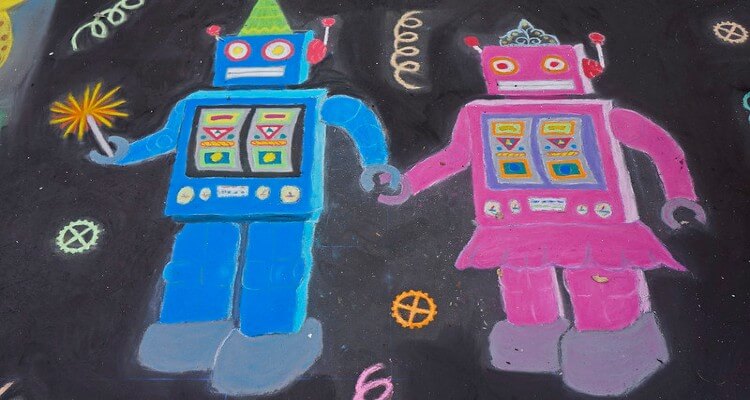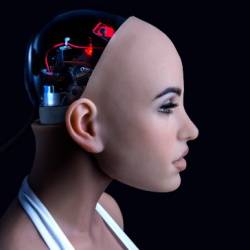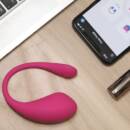People Who Connect Emotionally to Robots Treat Them Like Intelligent Beings
Surprising results in gender bias study show humans might not be such a bad bunch after all.

This did surprise us. There was only a very slight difference in a couple of jobs but not significant.
The above quote is from Professor Ayanna Howard, who chairs the Georgia Institute of Technology’s School of Interactive Computing.
The surprise is the unexpected results of two studies Howard conducted to determine whether a person’s view of a robot’s competency would be swayed by its apparent gender.
What Howard discovered potentially opens the door to bigger questions, such as whether her studies actually expose more of our society’s innate sexism, and how insecure and even defensive many are in regards to automation?
There’s also the possibility of a yet unexplored aspect to her discoveries: possibly explored by herself or other future researchers by asking the same questions about gender bias, but this time in regards to sexbots.
Will people consider them more intimidating because of their lifelike appearance, or is that what brings them close to being considered human?
Less about gender and more about perceived competency
To put together the studies, Howard, joined by fellow researchers De’Aira Bryant and Jason Borenstein, showed 200 participants a video where an androgynous robot introduced itself with either a masculine or feminine voice.
Next, participants were given a questionnaire asking them whether they thought the robot would perform competently in a range of occupations. This was to determine whether the perceived gender might play some part in how they viewed the robot’s abilities.
As was said above, when the results were tallied it revealed that gender hadn’t played a big part in how the robots were viewed. They did, however, show a marked dismissal by human subjects the machines would ever be as good as a human being.
As Professor Howard put it:
The results baffled us because the things that people thought robots were less able to do were things that they do well. One was the profession of a surgeon. There are Da Vinci robots that are pervasive in surgical suites, but respondents didn’t think robots were competent enough.
Not to dismiss Howard’s research or her conclusions, but when you think about it, these kinds of answers aren’t exactly a shocker.
The possible impact automation may have on the economy—particularly during the current pandemic—being on a lot of people’s minds right now.
Additionally, when robots do their jobs very well they’re practically invisible. But when they don’t, often comedically, that gets much greater attention, and so skewing their perceived usefulness.
‘Don’t reinforce gender stereotypes’
Referencing her study, Howard also told Georgia Tech manufacturers focus on creating products that are androgynous instead of assigning robots a gender.
Developers should not force gender on robots. People are going to gender according to their own experiences. Give the user that right. Don’t reinforce gender stereotypes.
This is absolutely admirable, more than anything as it reflects the reality that gender is a social construct and must always be a personal preference and never imposed without consent.
Howard further gives credit that for certain occupations, robots can actually be ideal:
Robots can be good for social interaction.They could be very helpful in elder care facilities to keep people company. They might also make better nannies than letting the TV babysit the kids.
Why not talk about sexbots?

What would have been fascinating would have been what results showed if Howard’s studies included sexbots and those who find emotional and physical pleasure in them.
Readers of Future of Sex are no doubt more than aware that many people form intimate relationships with their sexbots, sometimes considering them not necessarily another human being but rather as a different kind of person.
So much so that if they should no longer function the impact can be devastating.
Including this alternative side to robots and gender could have expanded on the study’s participants, as well as those who have voiced their concerns about the possible effect sexbots might have on society.
Finally, as female-identified people have become a growing side of the sexbot marketplace, hearing from them as well as male-identified owners could provide valuable insight into how gender roles are evolving—or, conversely, how thoroughly entrenched they still remain.
‘—as if they were fellow intelligent beings’
To be fair, Howard actually did touch on this aspect to robotics, though perhaps not specifically in regards to sexbots, saying:
Then there are emotionally engaging robots designed to tap into our feelings and work with our behavior. If you look at these examples, they lead us to treat these robots as if they were fellow intelligent beings.
Which is an apt way to bring this discussion around to where it started: that even though Howard didn’t directly investigate them, sexbots, as opposed to the genderless variety, are ideal examples of technology created to elicit an emotional reaction.
And, while there are those that still view them threateningly, just as a robotic surgeon is dismissed for not being competent, others find that gendered sexbots do their job extremely well: evoking tenderness and love—along with desire.
Image sources: Jeena Paradies, Damian Gadal
Leave a reply
You must be logged in to post a comment.

















